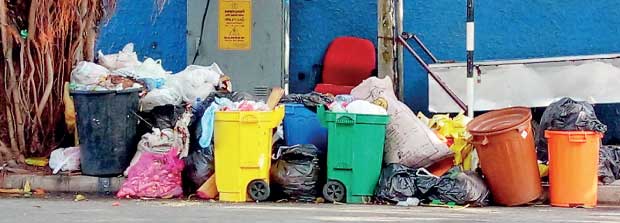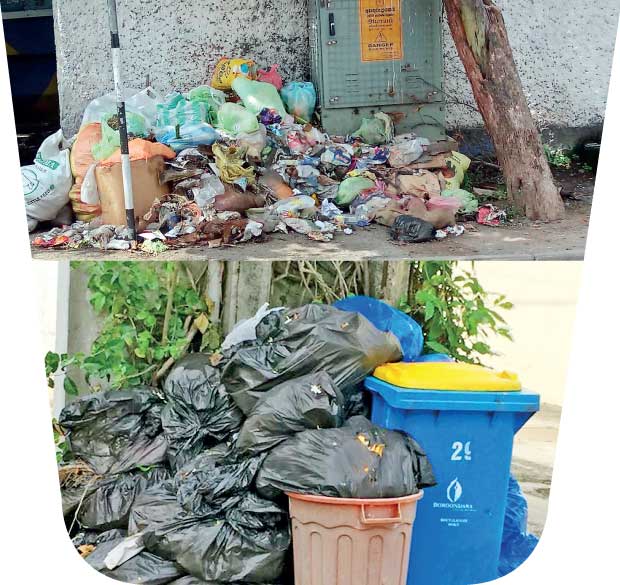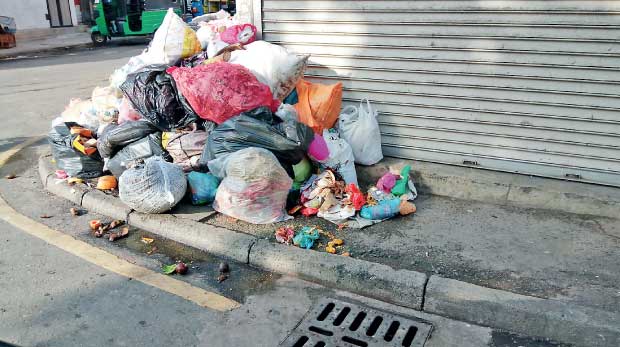19 Jun 2017 - {{hitsCtrl.values.hits}}

Over the past couple of weeks, if one were to roam through the streets of Colombo they would probably not be able to do so without covering their nose and mouth due to the strong stench of garbage. Ever since the collapse of the man-made garbage dump in Meethotamulla which killed 32 innocent citizens in early April, the collection of garbage in Colombo has been irregular.
The Daily Mirror spoke to garbage collectors in the city last week and learnt that they were told not to collect the garbage that was dumped on the roads as there was no place to accumulate non-segregated garbage. They further said they were informed to refrain from collecting the garbage that had not been separated in households and shops.
Accumulation of garbage on the streets can give rise to many health risks if not cleared in an efficient manner
The Daily Mirror approached Professor Arjuna de Silva who said that this accumulation of garbage on the streets can give rise to many health risks if not cleared in an efficient manner.
Meanwhile, many leading schools in Colombo have started their own garbage management with the encouragement of the Colombo Municipal Council (CMC) and the Ministry of Education. Segregation of garbage has been initiated in schools where separate bins have been allocated for degradable and non-degradable waste, while the distribution of food in paper bags instead of polythene has begun. Schools have further advised their students to use polythene less and to bring their lunch in lunch boxes.
The Daily Mirror further learns that piling dumps of garbage on the streets will be collected and the streets of Colombo will be cleared of this menace, with hopes that such an issue will not arise again and that people will learn to separate their garbage in order to ensure that the management of garbage in the city will go smoothly.

Garbage on the streets of Colombo
According to CMC Commissioner V.K.A. Anura the CMC had implemented a policy to collect the segregated garbage from November 1 last year, “Although we had implemented such a regulation we gave the people many chances to start segregating their garbage and we continued to collect the garbage. We kept accepted the garbage but they did not start the segregation process. When we stopped collecting the garbage that had not been segregated the people started to dump their unsegregated garbage on the streets. People acted indifferently to the regulations given and dumped their garbage in front of houses and temples thinking that it would be collected from the roads. We fully expect the people to separate their garbage into degradable waste and non-degradable waste”
Military police who have been relieved of their duties will be patrolling the streets in the nights in order to prevent and catch those who dump on the streets. This is the current action that we are taking to be rid of this problem
Speaking of what the garbage collectors had related he further said, “ There is no place for us to keep the garbage that has not been separated, which is why we didn’t collect it. However, when it comes to the garbage that has been segregated we have places to take them to and recycle.”
Speaking of what will be done to overcome the problem of garbage being dumped on
the streets, Mr. Anura said,” Military police who have been relieved of their duties will be patrolling the streets in the nights in order to prevent and catch those who dump on the streets. This is the current action that we are taking to be rid of this problem.”
Mr. Anura further said that the CMC has not being collecting the garbage that was on the roads in order to send out the message that the garbage needs to be segregated since the people did not abide by that rule. “Now we feel that the people have come to understand that the garbage needs to be separated in order to be collected, which is why we will be cleaning up the streets.”
At School Level
The Daily Mirror spoke to leading schools in Colombo and learnt that the CMC and the Ministry of Education is taking steps to start garbage management at school level. Schools such as Royal College, Ladies’ College, Visakha Vidyalaya and St. Bridget’s Convent stated that their garbage is being collected by the CMC but they have been advised to separate the garbage into degradable and non-degradable waste.
Schools such as Visakha and Ladies’ are separating the garbage in bins and sending away waste such as paper for recycling and food waste for composting and have started the practice of giving food in paper bags in their canteens. Schools have also advised their students and teachers to bring their food in boxes instead of polythene bags.
Schools such as Visakha and Ladies’ are separating the garbage in bins and sending away waste such as paper for recycling and food waste for composting
We further learnt that more time needs to be given in larger schools such as Royal College in order to get the students used to the segregation process and that they are working to reduce the amount of non-degradable waste that is created. Many meetings and awareness programmes have been conducted for officials in the schools to encourage them to manage and reduce the garbage in the respective schools.

Health Consequences due to the Accumulation of Garbage
According to Professor Arjuna de Silva, Professor in Medicine, Faculty of Medicine, Ragama there are many health consequences that can arise due to the accumulation of garbage in the area. “The obvious consequence is dengue. Because it has been shown that dengue mosquitoes can breed even in dirty water now and not just clean water. There will be an increase in flies in the area which would lead to a rise in food borne and fly borne diseases such as cholera, typhoid, dysentery”
If the garbage starts contaminating the water supply, such as our drinking water and the water we use for washing:many issues can arise on a domestic level
He further said that if the garbage starts contaminating the water supply, such as our drinking water and the water we use for washing: many issues can arise on a domestic level. Fly borne, mosquito borne, even filaria like diseases and even skin allergies can increase. Analysing the consequences at school level, he said,“In schools, as there is a large population of young people in one place, who are very susceptible compared to older people and there is the danger of the spread of contagious diseases. As older people have built immunity over such diseases over the years such a high risk does not crop up for them”.
23 Dec 2024 12 minute ago
23 Dec 2024 2 hours ago
23 Dec 2024 2 hours ago
23 Dec 2024 2 hours ago
23 Dec 2024 4 hours ago